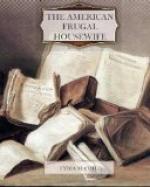[Footnote 1: There are two kinds of green paint; one is of no use in destroying insects.]
Lamps will have a less disagreeable smell if you dip your wick-yarn in strong hot vinegar, and dry it.
Those who make candles will find it a great improvement to steep the wicks in lime-water and saltpetre, and dry them. The flame is clearer, and the tallow will not ‘run.’
Britannia Ware should be first rubbed gently with a woollen cloth and sweet oil; then washed in warm suds, and rubbed with soft leather and whiting. Thus treated, it will retain its beauty to the last.
Eggs will keep almost any length of time in lime-water properly prepared. One pint of coarse salt, and one pint of unslacked lime, to a pailful of water. If there be too much lime, it will eat the shells from the eggs; and if there be a single egg cracked, it will spoil the whole. They should be covered with lime-water, and kept in a cold place. The yolk becomes slightly red; but I have seen eggs, thus kept, perfectly sweet and fresh at the end of three years. The cheapest time to lay down eggs, is early in spring, and the middle and last of September. It is bad economy to buy eggs by the dozen, as you want them.
New iron should be very gradually heated at first. After it has become inured to the heat, it is not as likely to crack.
It is a good plan to put new earthen ware into cold water, and let it heat gradually, until it boils,—then cool again. Brown earthen ware, in particular, may be toughened in this way. A handful of rye, or wheat, bran, thrown in while it is boiling, will preserve the glazing, so that it will not be destroyed by acid or salt.
Clean a brass kettle, before using it for cooking, with salt and vinegar.
Skim-milk and water, with a bit of glue in it, heated scalding hot, is excellent to restore old, rusty, black Italian crape. If clapped and pulled dry, like nice muslin, it will look as well, or better, than when new.
Wash-leather gloves should be washed in clean suds, scarcely warm.
The oftener carpets are shaken, the longer they wear; the dirt that collects under them, grinds out the threads.
Do not have carpets swept any oftener than is absolutely necessary. After dinner, sweep the crumbs into a dusting-pan with your hearth-brush; and if you have been sewing, pick up the shreds by hand. A carpet can be kept very neat in this way; and a broom wears it very much.
Buy your woollen yarn in quantities from some one in the country, whom you can trust. The thread-stores make profits upon it, of course.
It is not well to clean brass andirons, handles, &c. with vinegar. It makes them very clean at first; but they soon spot and tarnish. Rotten-stone and oil are proper materials for cleaning brasses. If wiped every morning with flannel and New England rum, they will not need to be cleaned half as often.




